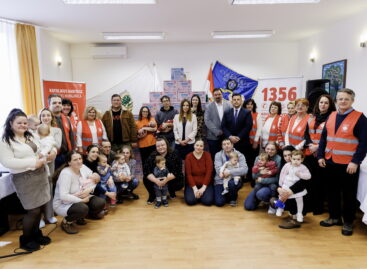DM helps make intimate hygiene products accessible to as many people as possible
dm is committed to supporting women’s health and continues to focus on the conscious development of physical and mental health with its initiatives. The focus of the drugstore’s social responsibility activities this year is on facilitating access to menstrual products on an international level. In Hungary, for every private label Jessa product sold in June, they will donate products worth 50 forints, while supporting the installation of two new deposit machines.
 Menstruation is a natural part of being a woman, but the topic is still considered taboo in many societies. This picture is also reinforced by the research that dm conducted internationally last year in collaboration with the Spectra Research Institute. A total of 6,000 women were interviewed in 11 dm countries, and 60% of the participants in the research feel that the topic of menstrual pain, hygiene needs and access to menstrual products do not appear with sufficient weight in public discourse. For many, menstruation is associated with stigma and shame. According to the research, the level of information is insufficient, while social acceptance is lacking and financial opportunities are often limited. The concept of menstrual poverty describes the situation when someone cannot afford to purchase the necessary hygiene products for financial reasons, or because of this, cannot replace the products as often as necessary. The lack of basic knowledge on the topic is also part of the problem.
Menstruation is a natural part of being a woman, but the topic is still considered taboo in many societies. This picture is also reinforced by the research that dm conducted internationally last year in collaboration with the Spectra Research Institute. A total of 6,000 women were interviewed in 11 dm countries, and 60% of the participants in the research feel that the topic of menstrual pain, hygiene needs and access to menstrual products do not appear with sufficient weight in public discourse. For many, menstruation is associated with stigma and shame. According to the research, the level of information is insufficient, while social acceptance is lacking and financial opportunities are often limited. The concept of menstrual poverty describes the situation when someone cannot afford to purchase the necessary hygiene products for financial reasons, or because of this, cannot replace the products as often as necessary. The lack of basic knowledge on the topic is also part of the problem.
As part of the Spectra research, dm also asked about the financial burdens associated with menstruation. 33% of respondents reported that purchasing menstrual products represents a serious financial burden for them. The drugstore is therefore specifically helping women and girls who would not otherwise have access to intimate hygiene products due to financial constraints.Last year, they donated 5 million forints worth of intimate hygiene products to the Hungarian Maltese Charity Service, and they helped the Budapest Medical Students Association create freely accessible educational materials with donations. The students also held educational workshops in the charity service’s institutions.
Related news
dm welcomes customers with stable prices and a superb price-value ratio
🎧 Hallgasd a cikket: Lejátszás Szünet Folytatás Leállítás Nyelv: Auto…
Read more >dm’s Together for Babies program continues this year
🎧 Hallgasd a cikket: Lejátszás Szünet Folytatás Leállítás Nyelv: Auto…
Read more >Related news
Festival buzz at the 60th anniversary EuroShop trade fair
🎧 Hallgasd a cikket: Lejátszás Szünet Folytatás Leállítás Nyelv: Auto…
Read more >Historic price reduction at ALDI
🎧 Hallgasd a cikket: Lejátszás Szünet Folytatás Leállítás Nyelv: Auto…
Read more >








